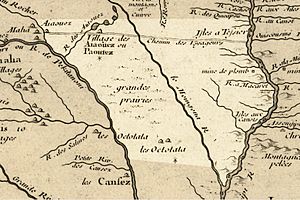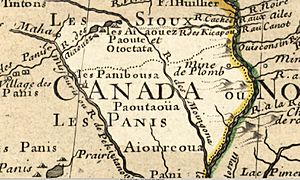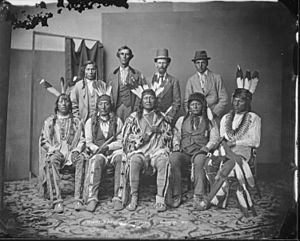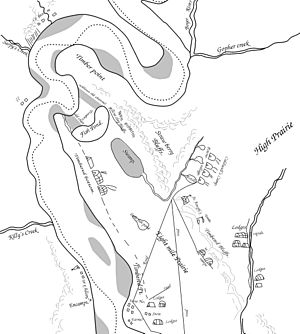American Indians of Iowa facts for kids
Native American people of Iowa include many different tribes and ancient cultures. These groups have lived in the area that is now Iowa for thousands of years. Over time, some groups moved within the territory. Other tribes migrated into Iowa from eastern areas, often because of new settlements or wars.
Contents
Ancient Times in Iowa
This section talks about tribes who lived in Iowa long ago, before Europeans arrived.
Chiwere-Siouan Speaking Tribes
These tribes spoke a language called Chiwere-Siouan. They are believed to be descendants of an ancient group called the Oneota culture.
When European explorers first arrived, these tribes lived across most of Iowa. The Ho-Chunk were mainly east of the Mississippi River in Wisconsin. The Ioway lived in northern Iowa. The Otoe were in central and southern Iowa, and the Missouria were in far southern Iowa. All these tribes were still active when Europeans arrived.
Dhegihan-Siouan Speaking Tribes
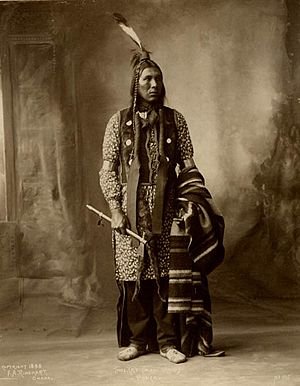
These tribes arrived in Iowa later in ancient times. They spoke a language called Dhegihan-Siouan.
The Dhegiha tribes lived near the Missouri River during the late ancient period and into historic times. They likely moved to this area from the south or southeast.
Other Siouan-Language Speaking Tribes
These tribes also spoke Siouan languages and were present in Iowa during late ancient and historic times.
These groups might be descendants of the ancient Mill Creek cultures. Their lands stretched into northwest Iowa. The Lewis and Clark Expedition even found Mandan villages far north on the Missouri River.
Dakotan-Siouan Speakers
The Dakota people moved south into much of Iowa during the 1700s and 1800s. European-American settlers often saw them. In 1840, a translator named Isaac Galland noted several Sioux groups living in or near Iowa. These included the Wahpekute, Sisseton, Wahpetonwan, Yankton, and Mdewakantonwan.
Historic Period in Iowa
This section covers tribes who lived in Iowa during the time Europeans were exploring and settling the land.
Caddoan-Speaking Tribes
These tribes might be descendants of ancient cultures from the Central Plains. These cultures lived in southwest Iowa, especially near what is now Glenwood, Iowa. A 1798 map shows the Pawnee in southwest Iowa, though their main lands were to the west.
Algonquian Speakers
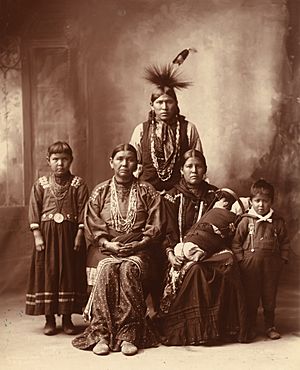
These tribes spoke Algonquian languages and were present in Iowa during the early historic period.
- Illinois Confederation (including the Moingona, Peoria, and Piankashaw)
- Kickapoo. A group of Kickapoo lived near the Upper Iowa River in the late 1600s and early 1700s. They might have been called the "Mahouea."
- Mascouten
- Meskwaki (also known as Fox)
- Sauk
As Europeans moved further west, and due to long-standing conflicts among tribes in the east, many eastern tribes moved into the Midwest. The Meskwaki people have continued to live in Iowa, even after they were officially moved in 1846. They later created a recognized Settlement.
Iroquoian Speakers
- Wyandot (also known as Huron)
The Wyandot were Iroquoian speakers from the early historic period. Like the Algonquian tribes, they were pushed into the Midwest because of European settlement and conflicts with other tribes in the east.
Tribes Who Moved into Iowa
These tribes moved to Iowa during the historic period, often due to forced relocation.
- Potawatomi
- Ojibwe (also known as Chippewa)
- Odawa (also known as Ottawa)
In the 1800s, many tribes were forced to move from their lands east of the Mississippi River. This led to some eastern tribes living in or near Iowa. Their original lands were around the Great Lakes. A Potawatomi Chief named Sauganash helped start a village that later grew into Council Bluffs, Iowa.
Other Visitors
Native American Settlements and Lands in Iowa
Notable Native Americans from Iowa
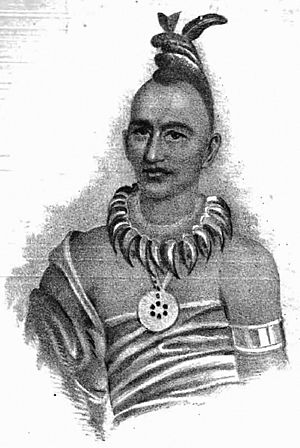
- Appanoose
- Antonine Barada (White Horse)
- Black Hawk
- Douglas Spotted Eagle
- Inkpaduta
- Keokuk
- Mahaska "White Cloud"
- Neapope
- Maria Pearson
- Quashquame
- John Raymond Rice
- Sauganash (Billy Caldwell)
- Sidominadota
- Taimah (Tama)
- Wabansi
- Wapello
- Watseka
- Ray Young Bear
- Notchininga "No Heart"
See Also
 | Georgia Louise Harris Brown |
 | Julian Abele |
 | Norma Merrick Sklarek |
 | William Sidney Pittman |


